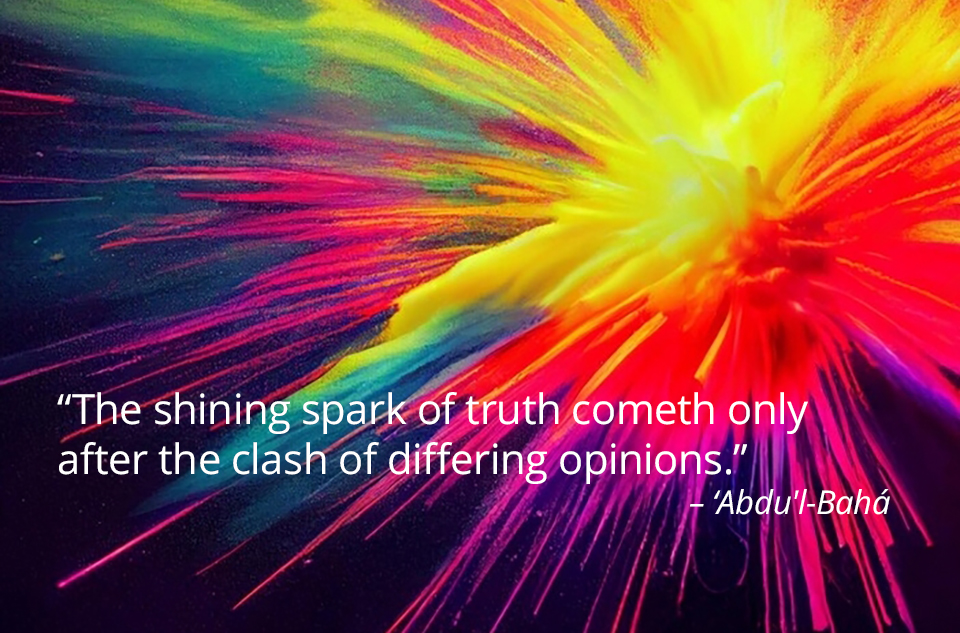 |
 |
|
June 21, 2024 More Than an End to War “The Great Peace towards which people of goodwill throughout the centuries have inclined their hearts…is now at long last within the reach of the nations…. World peace is not only possible but inevitable. It is the next stage in the evolution of this planet…” From “The Promise of
World Peace,” 1985,
by the Universal House of Justice 
“The Spiritual Dimensions of Conflict Resolution” was the topic that Cheshmak Farhoumand-Sims, an Ottawa Bahá’í with 40 years in the field of Peace and Conflict Studies, assigned herself. It was her second presentation in the “Big Ideas” lecture series (“The Role of Women in Peace,” November 2020), and attracted over 60 online participants on an April evening. It ranged from global principle to local practice. What is conflict? Is it always destructive? Traditionally, Farhoumand-Sims explained, we have tended to assume that conflict is bad and to be avoided; we believe it is resolved only through “zero-sum” processes, with winners and losers. However, seeing real-world conflict as simply an incompatibility of interests and goals allows those experiencing it to learn how to find resolutions that can be agreeable, or even beneficial, to all parties involved. Consider any war between or among countries, or even a relationship problem. The positions of each side are often very clear, but these are merely the tip of the iceberg; skilled mediators can draw out the interests of each that lie below the surface. What does spirituality have to do with conflict resolution? Farhoumand-Sims had three answers: first, religion remains a powerful motivator for many; second, scientific (logical) analysis doesn’t meet all the needs of conflicting parties; and finally, a spiritual approach sheds a new and creative light of its own. “We are not just material beings,” she argued. “When we connect with that deeper part of ourselves and others, a shift can occur. We can move people from anger, fear and hatred toward compassion and understanding.”
Cheshmak was propelled, as a young woman, into her life’s work by the
epic 1985 letter from the Bahá’í world centre to all humanity: “The
Promise of World Peace” is a radiantly hopeful document, but outlines
“the barriers to peace and how we can overcome them.” Many of these
barriers are attitudinal, spiritual. The spiritual dimension provides
the values, promoted in all the great religious traditions, that offer
guidance on living in harmony with others (humility, mutual respect,
kindness). It also provides ritual and practice, such as enactments of
forgiveness and repentance, that enhance personal validation and fellow
feeling. This sense of “community is a resource for resolving
conflicts,” Farhoumand-Sims maintained. She cited Buddhist thinker
Thich Nhat Hanh, who speaks of the need to sacrifice personal victory
in order to restore harmony within a larger group.
The same dynamic is observable in global conflicts. Competing histories of trauma and injustice can make international disputes seem intractable. Farhoumand-Sims has observed that carefully mediated “track two diplomacy” efforts have allowed antagonistic groups to see that neither side has a monopoly on suffering. The perceived need to debase others in order to raise ourselves up contaminates our ability to seek both truth and reconciliation. Many key Bahá’í principles apply. “So powerful is the light of unity that it can illumine the whole earth,” Bahá’u’lláh wrote. The power of unity is reinforced by his assertion of the essential nobility of human beings. As ‘Abdu’l-Bahá, Bahá’u’lláh’s son and the exemplar of his teachings, said, “The virtues of the seed are revealed in the tree; it puts forth branches, leaves, blossoms, and produces fruits…. Similarly…our creator has deposited within human realities certain virtues latent and potential. Through education and culture, these virtues…will become apparent in the human reality even as the unfoldment of the tree from within the germinating seed.” There are highly relevant spiritual practices to consider as well. “The Bahá’í community’s approach to learning is scientific,” Farhoumand-Sims stated, “and central to this is a very specific practice of consultation that we are learning to use.” It is founded upon frank and loving discussion, courage, detachment, the collective ownership of ideas and “leaving our ego at the door.” She also sees devotional gatherings as not merely sources of inner peace, but also as agencies of conflict resolution and healing from violent trauma. She concluded with a gentle and encouraging call to use these principles and practices right where we live. Cheshmak Farhoumand-Sims and friends instituted “soulful conversations” as a response to the emotional turmoil of so many after the most recent explosions of violence in Israel and Palestine. They have been a potent local example of how spirituality and conflict resolution can meet. Friends holding opposing views engaged in trust-filled and spiritually elevated conversations. One guest was grateful at the door: “I learned that when I let go of my need to prove and protect my side, and open myself to speak, I was also able to remain open to the speech from the hearts of others…” |
|
|